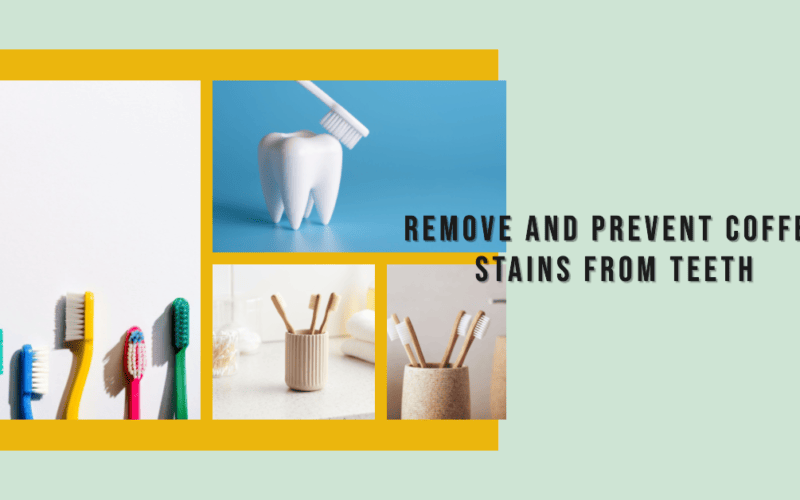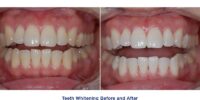How To Remove And Prevent Coffee Stains From Teeth

Have you noticed your teeth starting to look a bit dingy? If you’re a coffee fan, it’s likely that your morning cup of joe has left its mark on your smile. Don’t worry – there are ways to remove and prevent coffee stains from teeth.
With the right techniques, you can keep your teeth looking pearly white, even with your daily caffeine habit. From brushing to whitening, we’ll explore the range of methods to make sure coffee doesn’t cause any long-term damage to your teeth.
So, put down the mug and let’s get started!
How do you stop coffee from staining your teeth?
To keep your pearly whites white, it’s important to avoid anything that could discolor them – like coffee! But if you can’t resist a cup of java, there are some things you can do to reduce the risk of coffee-stained teeth.
The most important thing is to drink it with a straw. This will help keep the coffee away from your teeth and reduce the risk of staining.
Additionally, swishing water around in your mouth after drinking coffee can help to rinse any residual coffee away from your teeth. It’s also a good idea to brush your teeth immediately after drinking coffee. Doing this will help remove any particles that may have clung to your teeth and could potentially stain them.
Tips How to Remove Coffee Stains
Coffee stains on teeth can be a common concern for coffee lovers. If you’re looking to remove coffee stains and restore the natural whiteness of your teeth, here are some effective methods to try:
- Practice Good Oral Hygiene: Maintaining a regular oral hygiene routine is crucial for preventing and reducing coffee stains. Brush your teeth at least twice a day with a whitening toothpaste that contains mild abrasives. Additionally, floss daily to remove any plaque or food particles that may contribute to staining.
- Rinse with Water: After enjoying a cup of coffee, rinse your mouth with water. Swishing water around your mouth helps wash away coffee residue and minimizes the contact time between coffee and your teeth.
- Use a Straw: When drinking coffee, consider using a straw. Sipping through a straw directs the coffee away from the front surface of your teeth, reducing its contact and potential staining.
- Practice Oil Pulling: Oil pulling involves swishing oil (such as coconut oil) in your mouth for about 15 minutes and then spitting it out. This technique is believed to help remove stains and improve overall oral health. However, scientific evidence supporting its effectiveness is limited.
- Whitening Toothpaste or Gel: Whitening toothpaste or gel can help remove surface stains from coffee. Look for products that contain hydrogen peroxide or baking soda, which are known to have whitening properties. Follow the instructions provided with the product for safe and effective use.
- Professional Teeth Whitening: If coffee stains are deeply set and difficult to remove with home remedies, consider professional teeth whitening. Dentists can provide treatments like in-office whitening or take-home whitening kits with custom-made trays to effectively remove stains and brighten your teeth.
- Limit Coffee Consumption: Ultimately, reducing your coffee intake can help prevent further staining. Consider cutting back on the frequency or quantity of coffee you consume. You can also try drinking coffee in one sitting rather than sipping it throughout the day to minimize exposure.
Can coffee stains be removed from teeth?
With just a bit of effort, you can make sure your pearly whites stay sparkly and bright! Coffee stains can be removed from teeth, but it takes a bit of work.
The first step is to make sure you’re brushing your teeth twice a day with a toothpaste that contains fluoride. This helps keep plaque from building up on the surface of your teeth, which can cause the stains to set in.
You can also use a whitening toothpaste that contains abrasives to help scrub away any existing stains. Other methods of removing coffee stains from teeth include professional teeth whitening treatments, chemical bleaching agents, and baking soda.
Professional teeth whitening treatments are available at most dental offices and can help restore the natural whiteness of your teeth. Chemical bleaching agents can also be used to lighten teeth, but these should only be used with caution as they can damage the enamel.
Finally, baking soda can be used to scrub away coffee stains, but it’s important to rinse your mouth thoroughly afterward to avoid damaging your teeth.
How do coffee drinkers keep teeth white?
Do you want to keep your teeth looking their best, even if you’re a coffee drinker? There are plenty of ways you can keep your smile sparkling without needing to get rid of any evidence of your coffee habit – so why not give them a try?
One way to keep your teeth white is to brush them after you’ve had coffee. Doing this can help remove any staining that may occur and keep plaque under control.
You can also use whitening toothpaste and mouthwash, which can help reduce the presence of coffee stains. Regular flossing is a good habit to get into as well, as it can remove plaque and prevent staining from occurring in the future.
Additionally, you can try using whitening strips or visit your dentist for a professional whitening treatment. All these methods can help keep your teeth looking white and healthy, even if you’re a coffee drinker.
Do teeth stains fade?
You may be wondering if teeth stains ever fade away – the answer may surprise you! Fortunately, the answer is generally yes!
Teeth stains can fade over time with proper oral hygiene. This means brushing and flossing twice daily, using a toothpaste with whitening properties, and rinsing with a mouthwash that helps to remove surface stains. In addition, avoiding the consumption of highly pigmented foods and beverages (such as coffee) and scheduling regular dental appointments can help keep teeth white and free of stains.
However, it’s important to note that for some people, teeth stains may not fade as quickly as others. For those with deeper, more difficult to remove stains, professional teeth whitening may be the best option.
This is a procedure typically done at the dentist’s office and involves the use of specialized gels and treatments. Although it’s more expensive than other methods, it can produce immediate and long-lasting results.
What stains teeth worse coffee or tea?
Drinking either coffee or tea can discolor your teeth, so it’s important to be mindful of your consumption. Tea is generally considered worse for staining teeth than coffee because it contains more tannins.
Tannins are a type of antioxidant that can cause staining, and the longer the tea is brewed, the more tannins it will contain. Coffee also contains tannins, but they don’t bind to the teeth as easily as the tannins in tea. This means that coffee is usually less likely to cause staining than tea.
Additionally, coffee is naturally darker than tea, so it may be more noticeable when it stains the teeth. Fortunately, it’s possible to prevent staining from both coffee and tea by brushing your teeth regularly and avoiding overly acidic beverages.
How can I protect my teeth when drinking coffee?
Protecting your teeth when drinking coffee doesn’t have to be difficult – just be mindful of how much you drink and make sure to brush regularly!
One way to protect your teeth from coffee stains is to use a straw when drinking, as this will reduce the amount of contact between the coffee and your teeth.
Additionally, rinsing your mouth with water afterwards can help to reduce the amount of staining. You should also try to limit the amount of sugar you add to your coffee, as sugar will increase the likelihood of staining.
Finally, make sure that you brush your teeth at least twice a day with a fluoride toothpaste to help remove any remaining stains. By following these simple steps, you can ensure that your teeth remain healthy and free of coffee stains.
Additionally, you may want to try using a whitening toothpaste or mouthwash to help prevent further staining. By taking the time to protect your teeth when drinking coffee, you can enjoy your coffee without worrying about potential damage to your teeth.
Is teeth whitening worth it if you drink coffee?
Teeth whitening can be a worthwhile investment for coffee drinkers. It helps to counteract discoloration caused by the beverage. Professional teeth whitening treatments are often the most effective and can be performed safely in just one appointment. This is particularly useful for those who regularly drink coffee. It can keep teeth looking brighter and whiter, even if coffee is causing discoloration.
At-home teeth whitening products are also effective in removing and preventing coffee stains from teeth. However, the results may take longer to appear. With regular use of bleaching products, it is possible to keep teeth looking brighter and whiter for longer, despite the discoloration caused by coffee. It’s important to always follow the manufacturer’s instructions when using any kind of teeth whitening product to ensure it’s used safely and effectively.
At what age do teeth start to yellow?
As we age, our pearly whites can start to become dull and yellow, leaving us feeling self-conscious about our smile. Teeth can start to yellow as early as the teenage years, but the process is usually gradual and can be accelerated by certain lifestyle choices.
Factors that can contribute to yellowing teeth include: smoking, drinking coffee, tea, or red wine, poor oral hygiene, certain medications, aging, and genetics.
Conclusion
You can keep your teeth looking bright and white even with your coffee habit. With regular brushing and flossing, you can remove coffee stains and prevent them from occurring in the first place.
Teeth whitening treatments can be a great way to bring back that beautiful smile if your teeth have already yellowed. Start taking care of your teeth early in life, and you’ll be able to enjoy coffee without worrying about the long-term effects on your teeth.
So, enjoy that cup of joe, but don’t forget to brush and floss afterwards!









